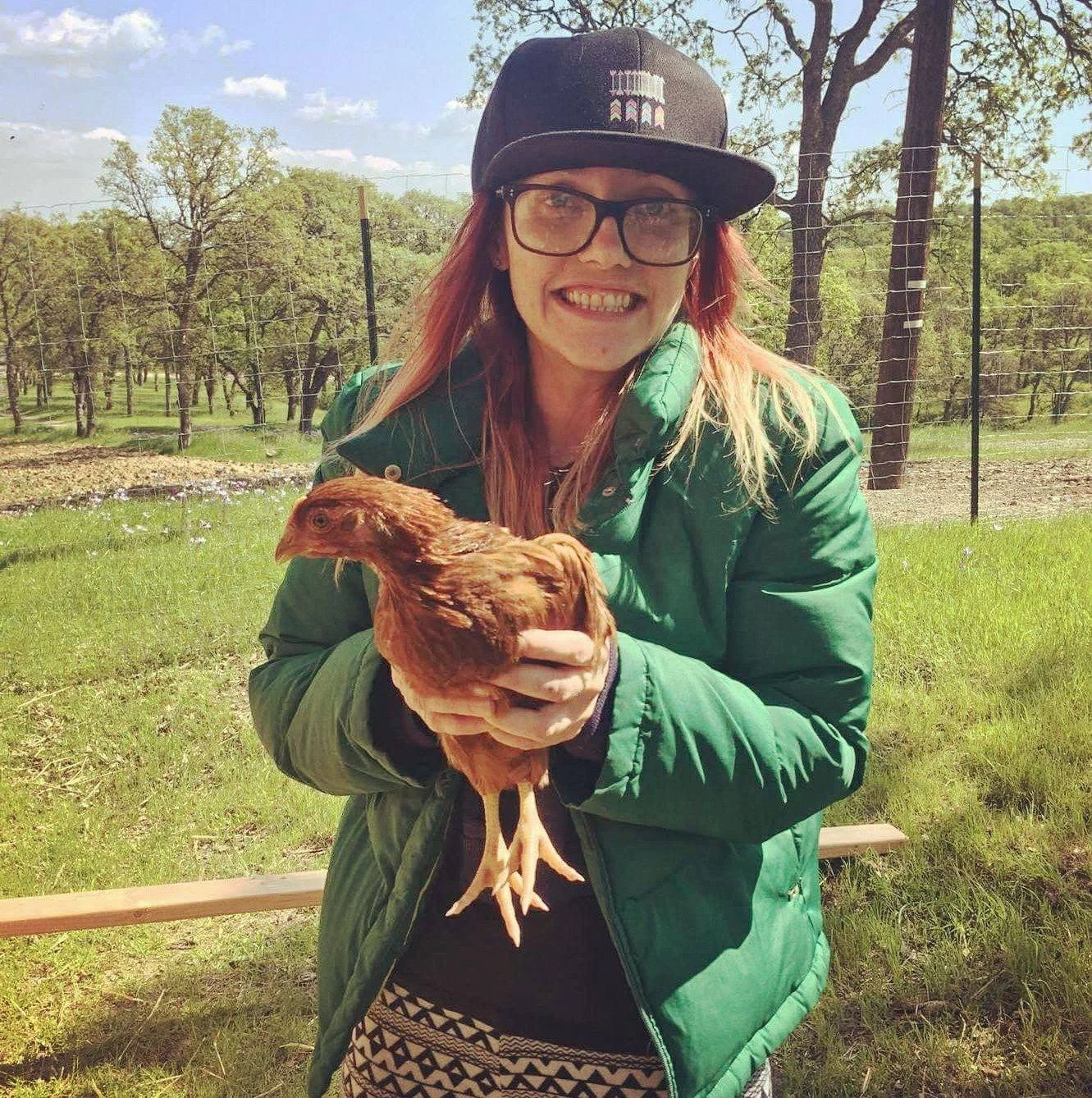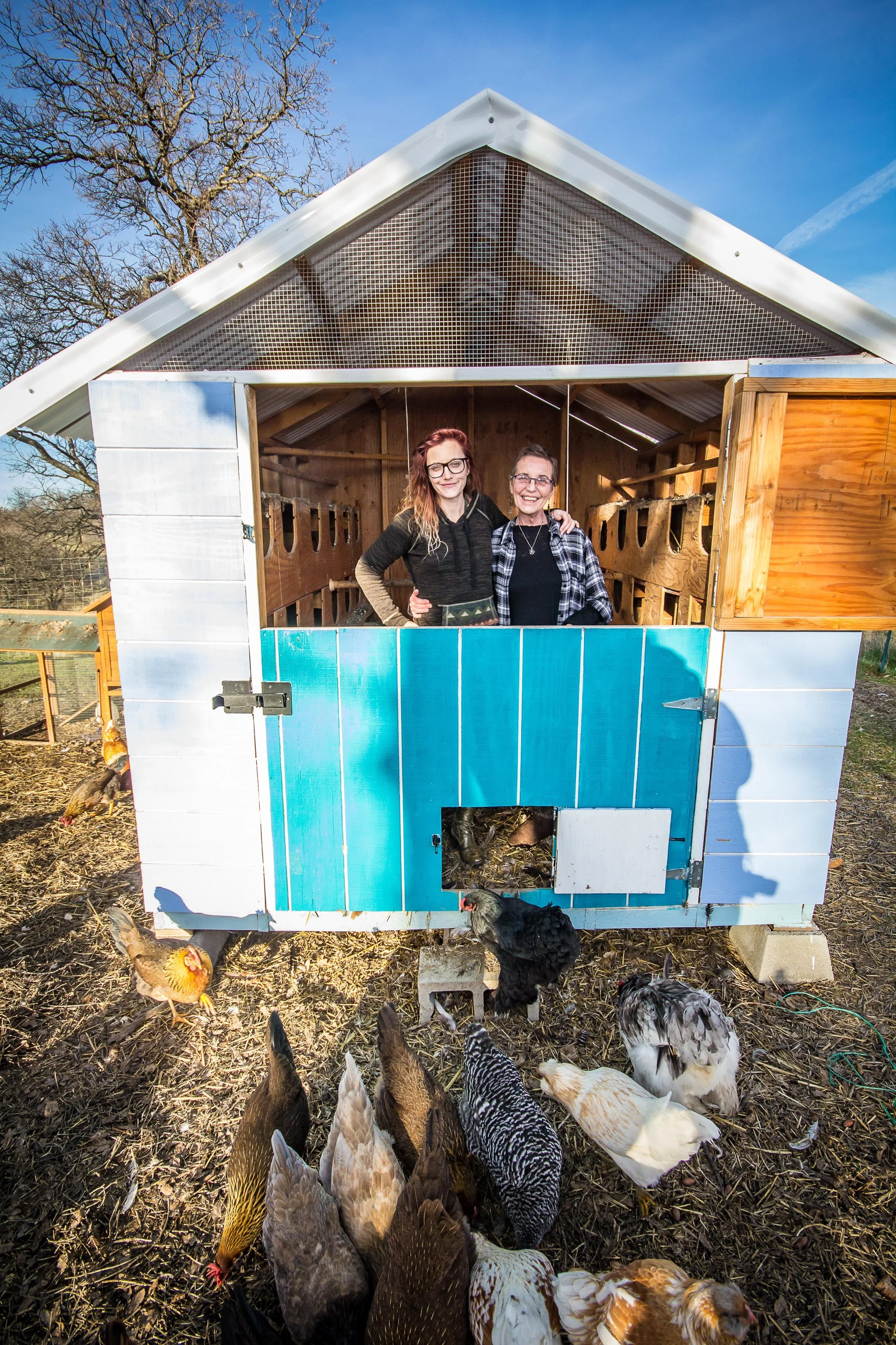Backyard Dinosaurs help save the planet
Chickens fighting climate change
Holding a Rhode Island Red, and very excited about it!
If this article was all about my adoration of our humble backyard dinosaur, you would very likely think me a chicken with my head cut off, pun intended. These funny little birds have won my heart a baker's dozen times, over and over. They are a delight, a tribulation, a secret weapon, and everything in between. I have seen chickens heal a broken heart better than a therapist, and I have witnessed a flock drive a sane person right over the edge. Regardless of the endless regalia I have of Gallus gallus, the first white meat, I am not here today to make you laugh, although it’s a bonus if you do. No, instead I aspire to convince you of the birds and their worth, globally and economically. Raising your own backyard chickens is one of the best ways to combat climate change, and by the end of this story, I’m sure you’ll be starting your own mini flock in no time. My efforts here may be slightly self-serving, as I am about to give it the old college try, and persuade my new roommates into getting some hens as soon as possible.
Chickens ran my life for a span of ten years or so, giving me quite the fowl adventure, as raising my own food has long been an endeavor of mine. My career as a farm to table Chef inspired me to adopt the lifestyle as fully as I could, and having your own chickens is an absolute must. I have been a nomad for a few years now, and a traveling coop is a bit out of the question. My flock stayed with me through several life partners, jobs, and towns. They certainly saved my broken heart. The birds taught me plenty, and I wish to learn from them again. I became the local Chicken Whisperer in my community, and still receive calls with curious bird questions to this day.
Chicken whispering, a barnyard version of Cesar Milan, can quickly become a passionate hobby, or obsessive compulsive sort of activity. It is a slippery slope, as any chicken-tender will tell you. First you start with three chicks, and suddenly you have fifteen birds in your backyard. Do not fret, I am here with environmental reassurance, the compulsion is actually a good thing. With the rise of global weather disasters, and other glaring climate change issues rearing their vicious heads, we must adopt an all hands on deck attitude when it comes to being proactive.
Let's consider our carbon footprint. A complex thing, we contribute to it in copious ways. Chickens can help us with several. Household waste; all food scraps can be fed to your birds, or thrown into a composting pile beside the coop. What isn’t edible for them, can decompose and create an ecosystem for bugs that chickens love to eat. Added free food for the flock. Paper trash and cardboard; we can shred that and use it in the coop instead of wood chips or sawdust. Again, reducing the amount of trash produced on a daily basis. Okay, but wait, there’s more. Eggs, fresh, snug as a bug under a rug, direct from under a fluffy feathered bum. Have you ever held one in your palm, warm and dry, magical golden gift that it is?
Ameraucana Hen, proud chicken
Studies in Belgium and a few other countries have shown a reduction in landfill using backyard coops. Two thousand households in the town of Limburg were given three hens each. Within a month the town was able to reduce landfill waste by over one hundred cubic tons. While this number is debatable, as the measuring of such a thing is very complicated, it sounds fantastic. Taking out the trash, with no paper or food waste, only non-recyclables going out to the curb, is less no matter how you cut it. As well as a bit less smelly, since all the decomposing food has been transformed into protein. Gifted to your family from your new best friends, wrapped in a delicate calcium encasing. Much time and money is spent researching ways to reduce waste, while one answer is clucking away under our very noses, just waiting for us to catch on. Recycling can be a pain, so using your scrap paper and cardboard trash in the coop again reduces landfill waste. Many farmers will use wood chips or straw as bedding. This might be hard to source in a city, but buy a little office paper shredder, and voila, you have free bedding for their nests, which also detracts from landfills.
Wildly green and lush gardens don’t just happen, they require fertilizer and nutrients. Chicken manure is one of the highest concentrations of nitrogen available. In massive amounts with commercial agriculture, this is a problem. For three or four backyard hens, this is a value. Utilizing your coop’s poops, you can ensure you have an all natural, locally produced fertilizer. Prize winning harvests come from a nutrient dense soil. Eggs supplied by the birds creates a reduction in commercial egg farming, thereby lowering emissions from concentrated animal feedlot operations. Eggs in the grocery store are likely six to eight months old, preserved with a petroleum based product. Your own eggs can sit on the counter, unrefrigerated, like nature intended, for two to three weeks. In the fridge, up to six. No unnecessary petroleum wasted either. Adding strength and backbone in yet another way, to your food independence quest.
The cost and expense of raising just a few chickens, if done correctly, is next to zero. Once their little coop is set up, they can survive on your kitchen scraps, wild insects, and some grain scratch feed from the country store, sometimes a bag of layer’s feed to get them through the winter. What if you have to leave for a weekend? If you have a solid coop where your hens are safe from predators, your only worries are feeding and watering. Solar powered farm tools are plentiful. Electric fencing is far more affordable than you might expect. Automatic coop doors are a wonderful device to help keep everyone secure, I’ve used them before. Setting them on a timer to open after sun-up, and close after sundown, ensures they are safe through dangerous nights. Most large sized feeders and drinkers will last three to four days, for a small flock. Let your neighbour know, they can collect the eggs while you’re away, and help keep an eye out for any shenanigans. With a little planning and the right tools, you can still leave the farm and know your babies will be just fine.
In today’s uncertain economy and teetering society, being able to maintain your own food supply may prove more valuable than previously thought. When I mentioned having chickens is a slippery slope, you can see from the photo at the end, I went from a small coop for a few birds, all the way to a custom shed condominium for birds. My last flock was over sixty fowl and poultry mixed. I miss them, and hopefully you felt the same intrigue as I, when considering your next food independence endeavor. We, as individuals, a nation, and a globe, need all the help we can get, reducing the damage done by climate change. If raising a few backyard hens can do all this, I can’t see why anyone wouldn’t want to head on down to their local farm store, and pony up a few new baby chicks.
Taking control of your own egg supply is a decision only you can make. Governmental control and regulation hinders us more than helps us. In most cases, urban chickens are permitted, so long as there are no roosters. There are several ways to cull males from the flock, and if you are tender-hearted, it is easy to find someone to come collect your unwanted cocks. Go hop on YouTube, it’s time to learn a new skill to help sustain yourself, and the planet. I am happy to answer any questions you may have regarding Chicken Whispering.
My Mother and I, in my largest coop to date.
All photography by James Tennery


